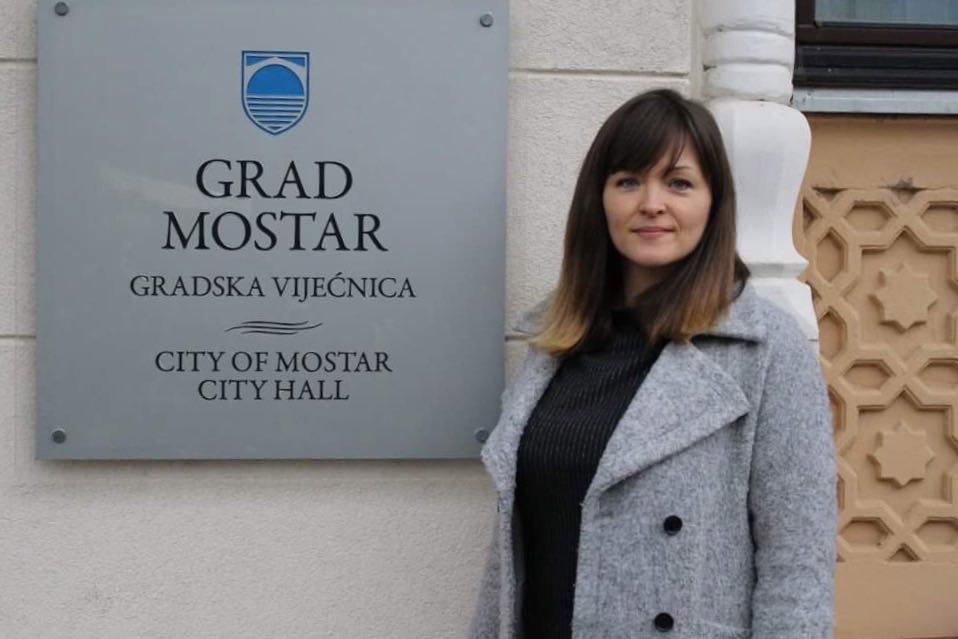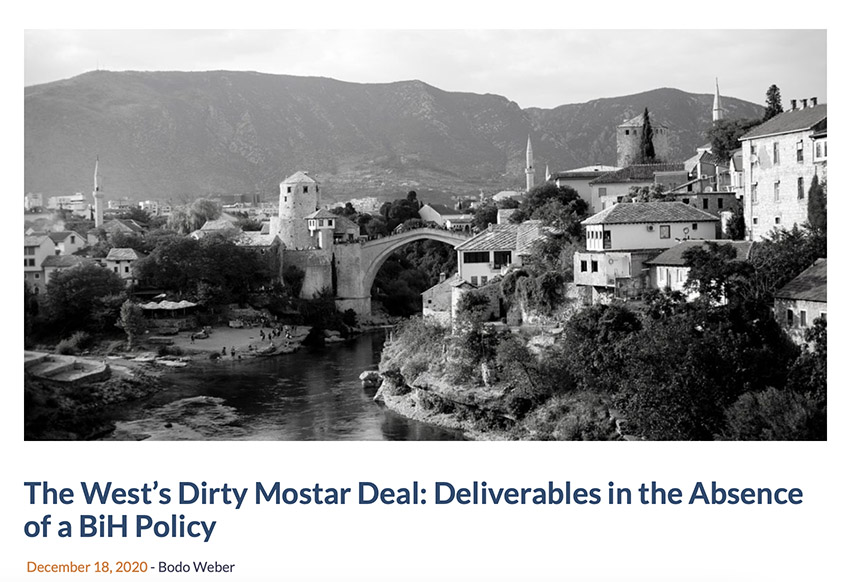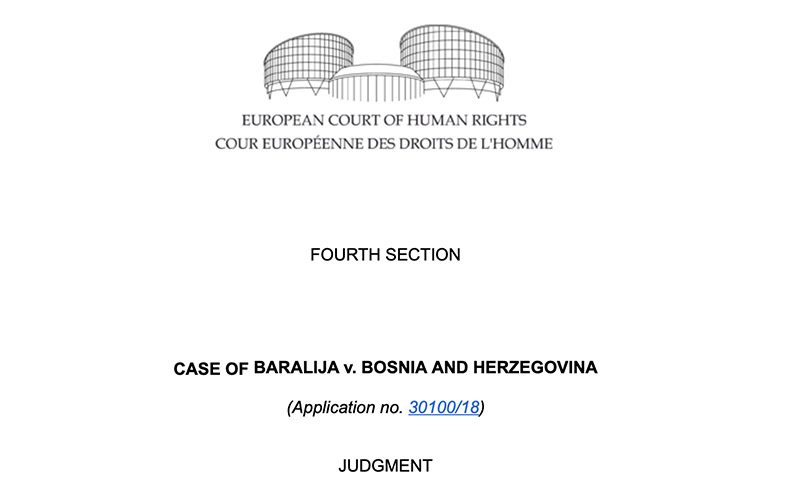by Anja Jerkovic
Perhaps it’s not the typical format one might envision a whistleblower to be; 36, a recent Master’s graduate, a mother and a local activist. No, Irma Baralija wasn’t the most politically engaged person in Bosnia and Herzegovina at the time when she decided to sue the country she lived in, but rather, the person most willing to believe so strongly in the possibility of change that her hope alone granted her the responsibility of carrying her vision of a democratic Mostar to fruition–that, and a little bit of luck.

(Article begins)
We just happened to speak on the 29th anniversary of the Dayton Peace Agreement (DPA), a document which, with its pivotal influence on the political organization of post-war Bosnia and Herzegovina, laid the foundation for a newly (re)built society which Irma Baralija would one day need to untangle to ensure that her and her fellow citizens of Mostar could again take part in holding fair and lawful city council elections, a privilege that had been revoked from them for what had become twelve long and progressively grim years.
To understand Baralija’s journey, one must have a basic understanding of post-war governance in the country of Bosnia and Herzegovina (BiH), as well as its impact on the political reformation of Mostar, a city known as the capital of the Hercegovina region and viewed as one of the most ethnically-diverse areas in both pre- and post- war BiH. Appealing to the three opposing sides of the conflict, namely, Bosnian-Croats, Bosnian-Muslims, and Bosnian-Serbs, temporary statutes had been established in the Dayton Peace Agreement (DPA) to ensure that the ethno-national identities present in post-war BiH would be equitably and fairly represented in future state and local elections. It was an attempt by Western actors to bring a halt to 3 and a half years of active conflict, and to establish a functional government meant to serve the interests of the people, and not the ethnically-organized political parties which, in many cases, sought to implement a “divide and conquer” mentality out of their own personal, political, and economical interests.
The DPA legitimized the idea that BiH is made up of three main ethnic groups it describes as ‘constituent peoples’: Bosniaks, Croats and Serbs, and that top political positions–the presidency as well as the house of peoples, are reserved for members from these 3 groups only. It was this classification of 3 constituencies that took part in perpetuating the idea that the citizens of BiH want to be categorized and separated to ensure the safety and prevalence of their people, and that minorities hold no weight in participating in critical decision making positions, which included Roma, Jewish, and “other” populations present in post-war BIH. This classification seemed even more problematic in Mostar, where the city’s governance system changed several times since the implementation of the DPA, and was meant to account for the forced displacement of specific peoples living in the region. In 2008, a year that would mark the last city elections until their return in 2020, the political party HDZ (the Bosnian Croat ethnic-oriented Croat Democratic Union) filed a complaint with the Constitutional court of BiH, citing that the various city areas in Mostar, of which there were six at the time, unfairly had the same power in electing members to local congress while having significantly varied population sizes.

In response, the High Representative in BiH, an international diplomat assigned with the task of overseeing the implementation of DPA in the country, released an opinion statement which read,
“it is argued that the means employed to create these power sharing mechanisms are clearly not disproportionate to the aims to be achieved. Respect of the principle of proportionality should take into account all its aspects and in particular the instrumentality of the measure, e. its ability to reach the pursued aim of respecting the equality of constituent peoples by creating effective power sharing mechanisms, which prevent any one people having majority control of the City Council” (Office of the High Representative).
Tensions grew, and In 2010, following the appeal by HDZ, the court found the framework for Mostar’s election system unconstitutional on the grounds that it was discriminatory, and ordered the state Parliament to change it. The pressure was on ethnically-charged political parties HDZ and SDA (the Bosniak ethnic-oriented Party for Democratic Action) to come to an agreement for a new electoral system in Mostar. Unable to do so, the BiH court invalidated certain parts of the law, making it impossible to hold legal and democratic elections in the city. When the 2008-elected Mayor’s mandate ended in 2012, the Ljubo Beslić (HDZ), undemocratically held his position, handling all major city decisions including infrastructure, city services, and an annual 20 million euro city budget alongside an SDA-appointed budget chief, with little to no oversight. Mostar’s electoral process was frozen in time, and much of the city’s opportunities to progress froze with it.
Baralija Returns
As the voting rights of Mostar’s citizens came to a halt, another moment was opening. In 2012, Irma Baralija was a 32-year old student, graduating from her Master’s programme in Political Science at the University of Complutense in Madrid. “I returned from Spain around the same time as the last mandate of the last city council. At that point, it was like we had run out of democracy,” Baralija commented. “I considered continuing my time in Spain to begin a PhD, but I chose to leave and return to Mostar because I thought, how can I be of use to my hometown?” Upon returning, Baralija, like many other local residents, couldn’t imagine that the political stalemate, which seemed almost impossible for a city in Europe to carry, would last long. Given its initial popularity in the media and status as the talk of the town amongst citizens, the display of Mostar’s messy political organization felt as if it carried a quick expiration date, a strange obstruction in business as usual but seemingly solvable. And yet, a full-year slowly passed with zero resolution alongside it. Political normalization rose, and the people, alongside the media, lost interest in the situation. An already worn-out-from-war society began to become more apathetic, relinquishing hope that anything in Mostar was possible or worthy of changing. It was a snapshot of a place where the citizens living within it lost whatever last drops of trust were left in those elected to represent them. Meanwhile, the major political parties HDZ and SDA continued to build political allies by blaming the other for Mostar’s lack of democratic leadership, further stoking the fire of division in the city.
“I felt like there must be something we, as local individuals not attached to any political party, could do,” Baralija stressed. Between February and May of 2014, political unrest rose amongst the citizens in all major cities of the country, materializing as organized protests against political corruption, low wages, and class inequality. These demonstrations highlighted the growing dissatisfaction with the status quo of the country, a movement aligned by the necessity for a revolution and not fractured by narratives of national identity. “We had 3,000 people on the streets in Mostar. This was the moment I had hoped that pressure would be put on the case of Mostar, that the local authorities would respond with a plan to restore local elections,” said Baralija. But the demonstrations began to die out several months from their onset, and little change resulted from them. Again, ordinary citizens felt defeated, unheard by state officials and settled with their demands unmet and the reality of living in a place run by political corruption. Baralija continued her life by taking on a position as a faculty member with the United World College (UWC) in Mostar.
Alongside her teaching profession, Baralija’s engagement with local activism continued, whilst taking on a new approach. “I decided that it wasn’t working, making changes as a citizen. The voice of the political parties weighed more than the voices of solitary citizens.” At that point, Baralija and several others revived the local organization and political party, Naša Stranka (NS, translated as “Our Party”) in order to begin brainstorming ways to put pressure on the State government to consider Mostar’s case again. In 2015, they managed to elect a representative from their party on the federal level with hopes that their presence would encourage the federal government to pressure the Parliament to fix Mostar’s electoral system by cutting funds to the city. Again, they were unsuccessful, and Baralija and NS continued to search for new ways to end what became a comfortably frozen local government, with Beslić still in power.
Sometimes, you need a wildcard.
When fighting a rather solitary battle, one could say that support needs to come from unexpected places–if you’re lucky. For Baralija, this looked like the mother of one of her UWC students, an attorney in Sarajevo who caught wind of her case and readily offered her legal support. “She was highly motivated and just asked me, ‘How can I help?’” Baralija fondly remembers. Progressively, they began to put together the case against Bosnia and Herzegovina, attempting to understand the various loopholes and obstacles one must cross in order to get to the place they needed to make a change, the European Court of Human Rights (ECHR). “They make it excruciatingly time-consuming,” Baralija lamented. “ The application process (of the ECHR) is so complicated, they’re really just waiting to see who is determined enough to make it to the end.” By sheer chance, or luck, Baralija’s attorney’s daughter happened to be interning at the ECHR that summer, and offered her support for understanding and completing all the necessary formulas for the application process. With that guidance, Baralija and her attorney were able to make it to the court with their case which would then be titled, “Baralija v. Bosnia and Herzegovina,” lodged on June 4th, 2018, based on the argument that she was “unable to vote and stand in the elections of the councillors to the City Council of Mostar, because of the legal void in the relevant legislation” (LawEuro). “ At that point, the court had recognized and accepted Baralija’s lawsuit, and Bosnia and Herzegovina was given 3 months to file a complaint against it.
They didn’t.
A temporary justice
On January 29th, 2020, the judgement had become final, and the Parliament had six months to correct the unlawful provisions which barred Mostar’s citizens from political participation in their own city. Baralija had succeeded in pushing forward a necessary act which had laid dormant for 12 years. Indeed, it was a victory, but one that would carry with it consequences for both Baralija and the city of Mostar. Following the ruling, Mostar’s two main parties, SDA and HDZ, criticized for their nationalist tendencies and corrupt organizational structures, became the leading designers of Mostar’s new electoral law. With Baralija’s initiative, Mostar was returned the right to vote again, but with their leadership, Mostar was again politically organized in a way that highlighted the division of its citizens, and once again placed an emphasis on self-identification through ethno-national identity as opposed to the unification of a population. As Bodo Weber remarked in his article on the West’s influence on Mostar’s local politics,
“the agreement… signs off on the ethno-territorial division of Mostar after 25 years of international efforts towards reunification of the once multi-ethnic city that was divided during the Bosnian war.” This was done, he writes, by “establishing a new HDZ-SDA power-sharing arrangement based on the ethno-territorial division of Mostar” (DemocratizationPolicy.Org.)
More specifically, HDZ and SDA’s new arrangement installed the idea of “one man, one vote,” which, as also commented on by the Office of High Representative (2009), runs “a risk of creating mono-ethnic authority elected in the areas in which one of the constituent peoples is in majority” (OHR.int). Baralija saw this verdict as a “two-staged plan from hell.” Instead of pushing BiH towards becoming more rights-based, it again justified the ethno-national division of Mostar’s citizens.

Baralija Takes a Seat
It was simultaneously a short-lived celebration and a fundamental shift in Mostar’s political structure. While it was clear that Mostar’s future as a unified city was still in jeopardy, the continuation of local elections opened the path towards democracy, and brought with it new candidates and thousands of youth born after the war who were able to vote in local elections for the first time. The sight of a young woman’s face on political banners gave a new beam of hope to the local landscape, like a new era was finally emerging. In the 2020 elections, perhaps because of her initiative and efforts, Baralija was democratically voted in as a city council member, representing her party “Naša Stranka,” and flagged as a political opponent to SDA and HDZ.
But, as history often reminds us, progress comes with backlash. There, Baralija was faced with yet another battle–staying true to herself. Upon her first week serving in the council, Baralija was already turned into a black sheep, refusing to use her vote as a council member towards electing a Mayor which, due to the fraught organization of the system in which the 2 main parties secured their place in power, left her with the option to vote only for a HDZ or SDA candidate. “It felt like, here’s a cart with one child, here’s a cart with 5. Which one to kill? I couldn’t do it. And this made people very angry with me, because they felt I had ‘given’ Bosnian-Croats the privilege of having a HDZ member as Mayor without using my vote to ensure the win of SDA. It was a moral decision, but it made the next four years extremely difficult for me, “ Baralija recounts. For her stance, she would face online threats on a continual basis, as well as an incident where her car was vandalized in the night, resulting in over 3,000 euros of damage. And, despite Baralija’s role in returning democracy to Mostar, her strife was downplayed and nearly unacknowledged by the major nationalist parties in the city. “Before every mandate in Mostar’s city council, SDA and HDZ would remind us of the way in which it was their efforts, their agreement, which returned elections and democracy to our city–not mine,” Baralija vented. But for those unobstructed by populistic views of which party, or rather, ethno-national group–succeeded in bringing local elections to Mostar, Baralija is still the woman, mother, and activist responsible for the change. It was her efforts, which were enacted despite growing apathy amongst Mostar’s citizens, that held the parliament of BiH accountable for its enforcement of human rights laws in Mostar, Bosnia and Herzegovina.
It doesn’t have to be me.
As our discussion came to a close, I noticed Baralija in an office setting with vintage posters of skiers from the 1984 Sarajevo Winter Olympics hanging in the background. Following her decision to step down from running for re-election in city council for the 2024-2028 term, Baralija and her family, which had now grown to include three children, decided to relocate to the BiH capital of Sarajevo, where she and her partner run an IT firm. When asked about her decision, Baralija confidently replied, “During my time on the city council, I was rarely listened to, and I decided I didn’t want to talk to the air anymore. There are other ways to create change, and being politically active is not the only one.” Actually, before her Master’s in Political Science, Baralija had studied Philosophy and Sociology, and had always dreamt of being a professor. “I didn’t want to be a career politician, I never aimed for that. Actually, I don’t believe that you must stay in politics once you enter. I became proactive to make the elections happen, but to have continuity, it doesn’t have to be me. It should be someone else, continuing the work.”
Despite often feeling silenced and readily ignored, Baralija managed to fight for women’s rights during her time in city council. She argued for more city budget funds to be relegated to women’s health care, cutting waiting time for pap smears from 3-6 months to 3-6 weeks. In addition, it is because of Baralija that mothers in Mostar are now offered one free visit with a doula upon birth, a huge support service for a country in which the importance of maternal care is highly unrecognized. And, though not successful to push for more women representation on Mostar’s city street names, which women are currently represented as 2/150-200, Baralija managed to remember the Sister’s Bergmann in her old workplace of the United World College, enacting a plaque serving to remind current students of the first Bosnian women to attend and graduate from the establishment. To highlight the importance of such moves, researcher for the Democratization Policy Council Valery Perry commented, “This current system is always going to be bad for women because it’s regressive—it’s right wing. When you see women fighting for these rights, it’s even more important because they see that it’s bad for them and their daughters.” Baralija’s presence in local politics put women’s issues on the table, but too few were given the urgency they deserve.
A long and exhaustive road behind her, I ask Irma if she had any regrets, anything she might have done differently. “Actually,” she replied, “I’ve been working on a book set out to be published in just a few months regarding this period and more.” Her upcoming book, a mix of memoir and instructional guide, a sort-of letter to her younger self which uses her experience, mistakes included, advises other young women eager to engage in BiH politics for their future endeavours and seeks to make further useful the struggle that she endured to play her part in Mostar’s democratic future. “I’ve had three kids in the last six years, and I’ve been actively talking about issues in Mostar for 10. I’m ready to work on my inner self now.”

